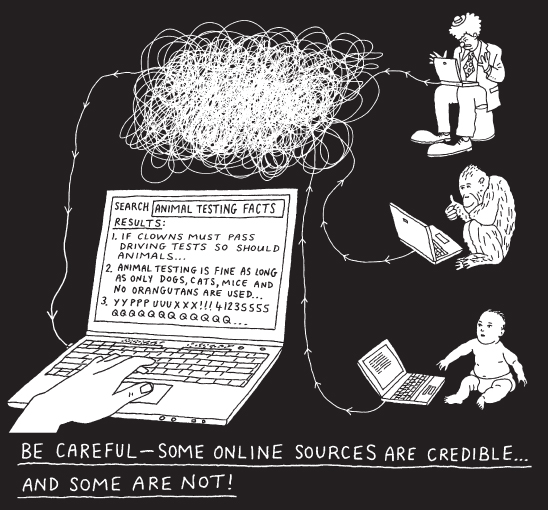Evaluating the Credibility of Online Sources
Printed Page 212
Evaluating the credibility of Web sites can be particularly difficult. Many sites fail to identify authors or the dates of publication, and even sites that indicate authorship may provide no information on authors’ credentials. And, of course, many articles are posted online without expert reviewing or editing.
Thus, it’s essential that you develop guidelines for evaluating the credibility of all sites you’re considering using. For example, if a Web site provides the name but not the qualifications of an author, research that author further—either online or in periodical indexes such as Academic Search Premier—to see if he or she has published in scholarly journals. For online documents that don’t indicate an author, try to determine what organization sponsored the site, and then assess that organization’s credibility through further research.
How can you learn about a sponsoring organization? Robert Berkman, a faculty member of the graduate media-studies program at the New School University, suggests reviewing the organization’s stated purpose to gain insight into its objectivity or bias. Also research the credentials of any listed directors or board members of the organization. Consider whether they may have any political or economic interest that compromises their objectivity.22

The Virtual Chase, a Web site established to teach legal professionals about online research, offers the following additional guidelines for assessing the credibility of Internet information:23
- How credible are the Web sites linked to and from the site? If the linked sites are credible, the site in question is more likely to be credible.
- Does another credible source provide information similar to that found on the site you’re evaluating? If so, that’s a good sign of credibility.
- Does the site weigh arguments for both sides of an issue? If so, this suggests objectivity—a key criteria for credibility.
- Is there advertising on the site? If so, evaluate whether the site’s creator(s) may have an economic incentive to offer content that pleases the advertiser.
- Is the site’s word choice professional? A source is more likely to be suspect when it uses biased language (see chapter 12) or denigrates those with opposing viewpoints.
If it is not apparent that a Web site meets the criteria for credibility as an evidence source (expertise, objectivity, observational capacity, and recency), do not use that site.